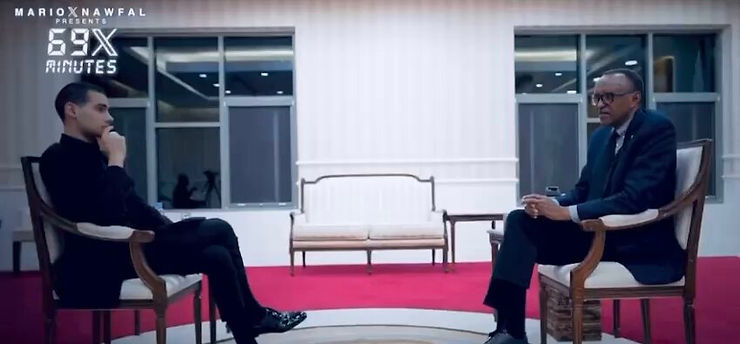𝐏𝐨𝐥𝐢𝐒𝐜𝐨𝐨𝐩 𝐓𝐚𝐤𝐞 𝐨𝐧 𝐌𝐚𝐫𝐢𝐨’𝐬 𝐈𝐧𝐭𝐞𝐫𝐯𝐢𝐞𝐰 𝐰𝐢𝐭𝐡 𝐏𝐚𝐮𝐥 𝐊𝐚𝐠𝐚𝐦𝐞
- PoliScoop

- Mar 12
- 2 min read

In an era where mainstream media often prioritizes sensationalism over substance, Mario Nawfal’s 69-minute interview with President PaulKagame stands out as an exemple of what journalism could—and should—be.
Titled with a playful nod to its runtime, this conversation is anything but frivolous. It’s a deep dive into the complexities of the Congo crisis, Rwanda’s role in the region, and the broader dynamics of global power that shape Africa’s narrative. For once, we have an interviewer who doesn’t approach an African leader with 𝐀𝐑𝐑𝐎𝐆𝐀𝐍𝐂𝐄, preconceived notions or a hidden agenda, but instead with a genuine intent to listen, learn, and understand.
The interview comes at a time when Kagame’s name is frequently splashed across headlines, often painted with the broad brush of lies or complicity in the Democratic Republic of Congo’s turmoil.
Critics argue that Nawfal’s willingness to hear Kagame’s perspective somehow taints his credibility, branding him as corrupt simply for giving a platform to a controversial figure.
Yet this criticism misses the point entirely. What Nawfal achieves in this 69-minute exchange is a rare feat: he allows Kagame to speak for himself, unfiltered and uninterrupted, offering a counterpoint to the dominant narrative that international media so often distorts.
𝐂𝐨𝐧𝐭𝐫𝐚𝐬𝐭 𝐭𝐡𝐢𝐬 𝐰𝐢𝐭𝐡 𝐂𝐍𝐍’𝐬 𝐫𝐞𝐜𝐞𝐧𝐭 𝐢𝐧𝐭𝐞𝐫𝐯𝐢𝐞𝐰 𝐰𝐢𝐭𝐡 𝐊𝐚𝐠𝐚𝐦𝐞 where hours of discussion were boiled down to a one-minute clip, carefully edited to fit a preconceived storyline. That’s the mainstream media playbook—twist words, cherry-pick soundbites, and drown out nuance with noise. Yet they did not say CNN is bought by Tshisekedi ( which by the way might be the case)
Mario Nawfal , however, flips the script. There’s no arrogance in his demeanor, no disrespectful interruptions, no assumptions masquerading as questions. He sits across from Kagame not as a judge, but as a student of the situation, eager to peel back the layers of a conflict too often reduced to simplistic headlines. This is what journalism lacks today: the humility to let the subject breathe and the courage to let the audience draw their own conclusions.
President Kagame, for his part, seizes the opportunity. He doesn’t shy away from the tough questions—about Rwanda’s alleged involvement in Congo, the West’s double standards, or the United Nations’ failures. He speaks with the conviction of a leader who knows his story has been sidelined, laying bare the power struggles that keep Congo in chaos and the foreign hands that profit from its mineral wealth.
Whether you agree with him or not, there’s no denying the value of hearing his unvarnished perspective, free from the editorial scalpel of outlets more interested in clicks than clarity.
Mario’s approach is a masterclass in media done right. He doesn’t posture as an all-knowing arbiter of truth; he facilitates a conversation. He respects Kagame not just as a president, but as a voice that deserves to be heard—an African leader too often spoken over by those who claim to speak for him. In a world where mainstream media thrives on distortion and division, this interview is a refreshing reminder of what’s possible when someone dares to listen. For 69 minutes, we’re given a window into a side of the story that’s been buried under bias—and that, in itself, is revolutionary.
Big up to Mario!


Comments